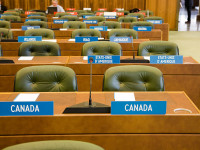The government’s MyDemocracy.ca survey/consultation/questionnaire launched yesterday to a steady stream of criticism as the initiative does not follow the typical consultative approach. Rather than asking direct questions about public electoral preferences, there are a series of questions on “values, preferences, and priorities” that are supposedly designed to discern user preferences. The questions focus on representation, parties, and voting rules (there are several questions on electronic voting that ask if there is support even if the systems are less secure).
The initiative is being run by Vox Pop Labs and the site’s privacy policy advises that the Privacy Act and PIPEDA apply. However, dig into the policy and you learn that users that do not provide detailed demographic information – including age, gender, education, household income, profession, language, interest in politics, and postal code – will not have their responses considered as part of the study. The specific provision states:











